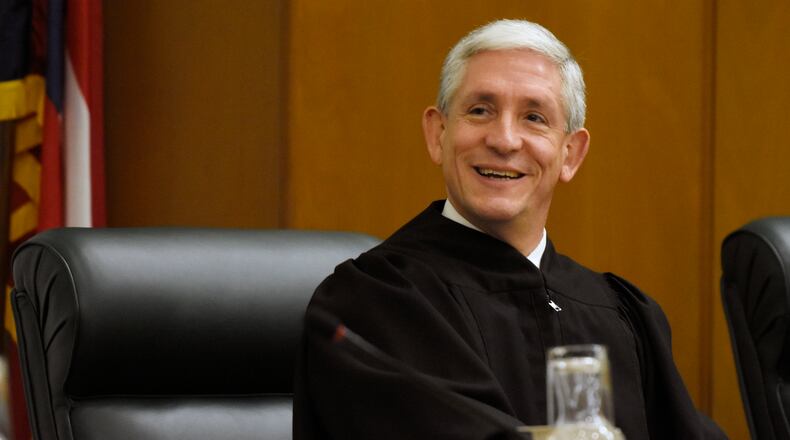Georgia’s chief justice on Tuesday asked for support and patience as the state’s judiciary struggles to climb out from under a mountainous backlog of cases due to the coronavirus pandemic.
“This will be the main issue that the judicial system of Georgia will be dealing with, not only until the rest of our society returns to more normal conditions, but for several years to come,” Chief Justice David Nahmias told the General Assembly in his annual State of the Judiciary address.
Nahmias gave some examples, such as what faces the six-county Southwestern Judicial Circuit. In 2019, it had 377 open felony cases; it now has more than 900. Muscogee County has almost 300 serious violent felony cases pending, including more than 100 jailed defendants charged with murder.
Those pending cases don’t include others in which defendants have been arrested for serious felonies but who are not yet indicted, he said. They also don’t include “all the other sorts of criminal cases, much less all the civil cases.”
Nahmias noted the Atlanta Braves had 102 games canceled in 2020 because of COVID-19. What if the Braves had to cancel another 102 games last year and those games and the ones canceled in 2020 had to be played and added to the 162 games scheduled for this season?
“That’s a 366-game season, and I’m not sure even our World Series champs could handle that,” he said. “This is the situation some of our courts are facing right now with their overall caseloads.”
Credit: GPB
Credit: GPB
Nahmias praised judges for coming up with innovative ways through remote proceedings to keep cases moving.
The chief justice noted that when Cobb County Superior Court Judge Tain Kell’s son contracted COVID-19, Kell conducted remote hearings from a makeshift courtroom in his bedroom while his family was quarantined. Kell even took a U.S. flag from his front porch so it could be displayed during the hearings.
Nahmias, who came down with COVID-19 when the omicron wave peaked last month, presided over remote oral argument sessions while isolating at home. “There’s no way I could have done that in January of 2020,” he said.
The pandemic has also magnified the challenges of how to deal with offenders with behavioral health issues, Nahmias told lawmakers.
One way to address them is through accountability courts, such as those that handle cases involving nonviolent drug offenders, veterans and drunk drivers, he said. They have been successful in reducing recidivism rates and have saved the state money by allowing offenders to reenter society and the workforce rather than being incarcerated.
“But beyond accountability courts, communities across Georgia need more resources to serve our fellow citizens with mental health issues,” Nahmias said. “Addressing this problem is not just good for our justice system and our economy, it’s a moral imperative.”
About the Author
Keep Reading
The Latest
Featured




